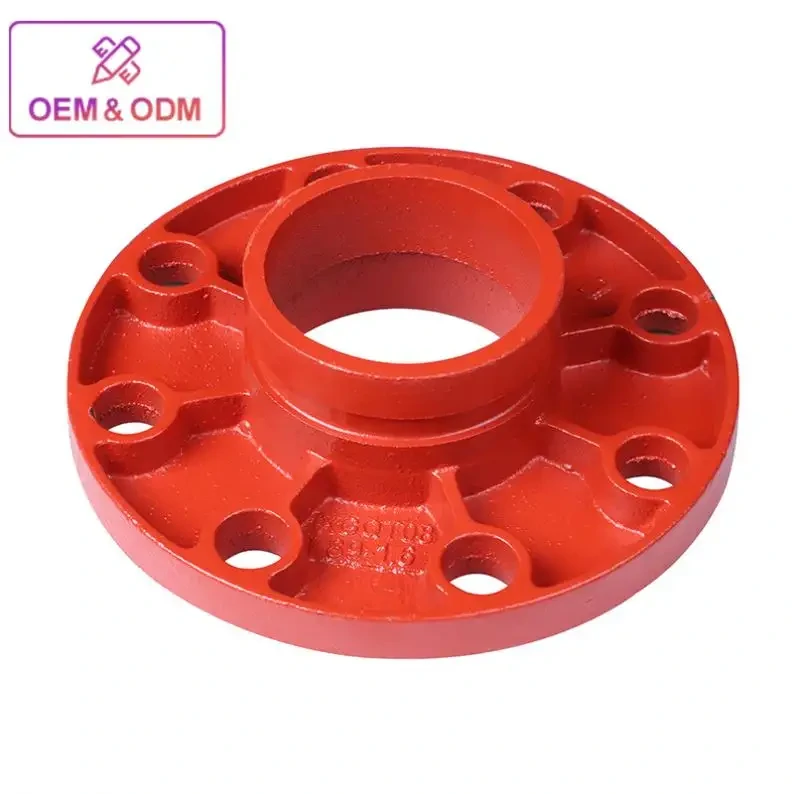Ductile iron pipe flange adapters are engineered to meet the specific requirements of high-temperature applications, providing robust and reliable connections in environments where elevated temperatures are present.
Here are several ways in which ductile iron pipe flange adapter technology caters to the requirements of high-temperature applications:
- Material Selection:
- Ductile iron is known for its strength and durability, making it a suitable material for high-temperature applications. Ductile iron pipe flange adapters are designed to withstand elevated temperatures without compromising their structural integrity.
- High Temperature Resistance:
- Ductile iron pipe flange adapters are designed to resist deformation, warping, or cracking at high temperatures. The material properties ensure that the flange adapters maintain their performance and structural stability under thermal stress.
- Coating and Linings:
- Protective coatings and linings applied to ductile iron flange adapters enhance their resistance to corrosion and oxidation, which can be accelerated at high temperatures. These coatings act as a barrier, preserving the integrity of the adapter in challenging environments.
- Compatibility with High-Temperature Fluids:
- Ductile iron pipe flange adapters are engineered to be compatible with a wide range of fluids, including those at elevated temperatures. This ensures that the adapter can be used in systems conveying hot liquids without degradation.
- Dimensional Stability:
- Ductile iron exhibits good dimensional stability even when exposed to high temperatures. This characteristic is important for maintaining the proper fit and alignment of the flange adapter in the piping system.
- Thermal Expansion Considerations:
- Ductile iron pipe flange adapters are designed to accommodate thermal expansion and contraction that occurs in high-temperature environments. This helps prevent stress on the piping system and ensures a reliable connection over a range of temperatures.
- Pressure-Temperature Ratings:
- Ductile iron flange adapters are manufactured and tested to specific pressure-temperature ratings. ductile iron pipe flange adapter These ratings indicate the maximum pressure the adapter can withstand at elevated temperatures, ensuring that they are suitable for high-pressure applications.
- Compliance with Industry Standards:
- Ductile iron pipe flange adapters are often designed and manufactured in accordance with industry standards that include temperature considerations. Compliance with these standards ensures that the adapters meet the necessary requirements for high-temperature applications.
- Thermal Stress Analysis:
- During the design phase, thermal stress analysis is often conducted to assess how the flange adapter will respond to temperature fluctuations. This analysis helps ensure the durability and reliability of the adapter under varying thermal conditions.
- Gasket Material Selection:
- The gasket material used in ductile iron flange adapters is carefully selected to withstand high temperatures while maintaining a reliable seal. Different gasket materials may be chosen based on the specific requirements of the application.
- Corrosion Resistance:
- Ductile iron pipe flange adapters are designed with corrosion-resistant features, protecting the adapter from the corrosive effects that can be exacerbated at high temperatures.
- Quality Control Measures:
- Rigorous quality control measures are implemented during the manufacturing process to ensure that each ductile iron flange adapter meets the required standards for high-temperature performance.
By addressing material selection, coatings, compatibility, thermal expansion considerations, and adherence to industry standards, ductile iron pipe flange adapter technology ensures reliable and durable connections in high-temperature applications. These adapters play a critical role in maintaining the integrity of piping systems that transport hot fluids or operate in elevated-temperature environments.
